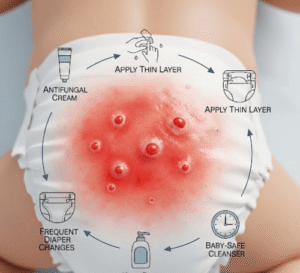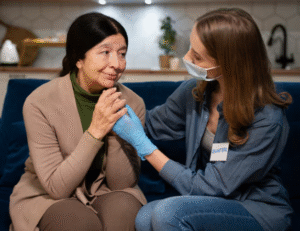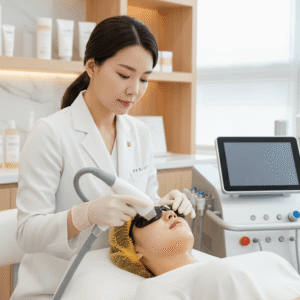Overview
Vaginal odor refers to any unpleasant or abnormal smell emanating from the vagina, which can indicate infection, hormonal changes, or hygiene issues. While a mild natural odor is normal due to vaginal flora, strong, fishy, or foul smells often signal underlying problems.
➤ Vaginal odor is influenced by pH balance, bacterial environment, hygiene, diet, and sexual activity.
➤ Persistent or strong odor may impact confidence, sexual health, and quality of life.
➤ In Korea, gynecology clinics provide diagnostic testing, medical treatments, and advanced therapies for managing vaginal odor effectively.
Key Facts
► Definition: Any abnormal or unpleasant smell originating from the vagina.
► Prevalence: Common among women, particularly those with infections or hormonal changes.
► Associated symptoms: Discharge, itching, burning, irritation, or redness.
► Risk factors: Bacterial vaginosis, yeast infections, poor hygiene, STIs, hormonal changes, and certain medications.
► Treatment in Korea: Depends on the underlying cause; includes antibiotics, antifungals, probiotics, and lifestyle counseling.
What Is Vaginal Odor?
Vaginal odor results from imbalances in the vaginal microflora or infections, producing chemicals that emit a noticeable smell.
➔ Normal vaginal odor is usually mild and slightly musky, varying with menstrual cycle and sexual activity.
➔ Abnormal odors are often strong, fishy, or sour, indicating bacterial or fungal overgrowth.
➔ Identifying the type, onset, and accompanying symptoms is essential for proper treatment.
What Symptoms Are Related to Vaginal Odor?
Symptoms may include:
→ Strong or unusual smell, often described as fishy, sour, or musty.
→ Change in discharge color or consistency, such as gray, yellow, or green.
→ Itching, burning, or irritation of the vulva or vaginal canal.
→ Pain during urination or sexual activity.
→ Redness or swelling around the vaginal area.
→ Fever or malaise if infection spreads systemically (rare).
Causes / Possible Causes of Vaginal Odor
Infections
➤ Bacterial vaginosis (BV) – Most common cause; produces a fishy odor with thin gray or white discharge.
➤ Yeast infections (Candida albicans) – Typically cause mild odor but intense itching with thick, white discharge.
➤ Trichomoniasis (Trichomonas vaginalis) – Yellow-green frothy discharge with strong odor.
➤ Other STIs – Chlamydia, gonorrhea, or Gardnerella vaginalis infections may cause odor changes.
Hormonal Changes
➔ Pregnancy, menstruation, or menopause can alter vaginal pH and flora, leading to odor changes.
➔ Hormonal contraceptives may influence vaginal secretions.
Hygiene and Lifestyle Factors
→ Poor hygiene or infrequent washing can contribute to odor.
→ Overwashing, douching, or using scented products may disrupt healthy vaginal flora, increasing odor.
→ Diet, including high sugar intake, may affect microbial balance.
Medical Conditions
► Diabetes can promote yeast overgrowth and strong odor.
► Vaginal atrophy in menopause may alter secretions and odor.
► Foreign bodies, such as retained tampons, can lead to foul odor.
When Should I See My Doctor?
Consult a doctor if vaginal odor is:
➤ Strong, persistent, or accompanied by abnormal discharge.
➤ Accompanied by itching, burning, redness, pain, or bleeding.
➤ Occurring during pregnancy, post-menopause, or after surgical procedures.
➤ Recurrent despite proper hygiene and over-the-counter measures.
➤ Early evaluation can prevent complications like pelvic infections, infertility, or systemic infections.
Care and Treatment
Lifestyle and Home Measures
► Maintain gentle daily hygiene, avoiding harsh soaps or douches.
► Wear breathable cotton underwear and avoid tight clothing.
► Practice safe sexual habits and clean genital area after intercourse.
► Maintain hydration, balanced diet, and good bowel habits to support vaginal health.
Medical Treatments
➔ Antibiotics for bacterial infections such as bacterial vaginosis.
➔ Antifungal medications (topical or oral) for yeast infections.
➔ Antiparasitic treatments for infections like trichomoniasis.
➔ Hormonal therapy or probiotics to restore healthy vaginal flora and pH.
Surgical and Advanced Interventions
→ Rarely, removal of foreign bodies or surgical correction of anatomical issues causing odor.
→ Management of chronic pelvic infections or atrophic changes may involve minimally invasive procedures.
Treatment Options in Korea
Korean gynecology clinics provide comprehensive care for vaginal odor:
Diagnosis in Korea
➤ Vaginal swabs and cultures to identify bacterial, fungal, or parasitic pathogens.
➤ Blood tests for hormone levels, diabetes screening, or infection markers.
➤ Imaging or hysteroscopy if structural causes are suspected.
Non-Surgical Care
► Prescription antibiotics, antifungals, or antiparasitics based on diagnosis.
► Probiotics and topical treatments to restore healthy vaginal microflora.
► Education on hygiene, lifestyle, and sexual health.
Advanced and Surgical Care
➔ Surgical removal of foreign bodies or treatment of anatomical abnormalities.
➔ Treatment for chronic infections or recurrent odor issues.
➔ Multidisciplinary approach integrating gynecology, dermatology, and infectious disease expertise.
Rehabilitation and Lifestyle Support
→ Follow-up for prevention of recurrence.
→ Guidance on diet, hygiene, and sexual practices.
→ Long-term monitoring for women with hormonal or structural predispositions.
Korean hospitals combine expert gynecologists, advanced diagnostic tools, and patient-centered care, ensuring effective management of vaginal odor and improved quality of life.













